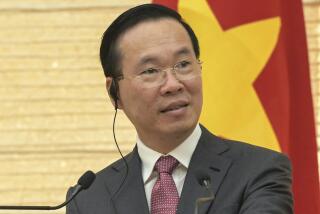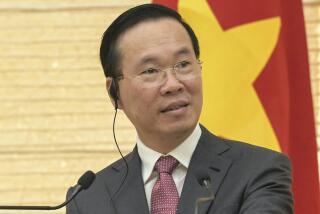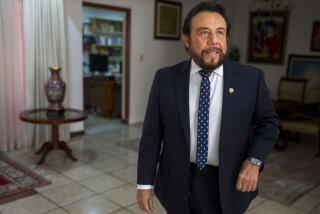Colombia’s Vice President Resigns in Frustration
- Share via
BOGOTA, Colombia — Vice President Humberto de la Calle resigned in exasperation Tuesday--a virtual admission that growing economic turmoil and anarchy will not force President Ernesto Samper out of office.
In an emotional presentation at a downtown hotel, De la Calle read a letter of resignation in which he made a desperate plea for the embattled president to step down for the good of the nation. But with Samper determined to serve out his remaining two years and now blaming De la Calle for the nation’s crisis, there seemed little hope that Samper would accede to his former running mate’s call for “an act of generosity.”
Samper has withstood similar demands from this nation’s most important economic groups, and from the Roman Catholic Church and the Social Conservative Party, Colombia’s major opposition party. He has stated repeatedly that Colombia would only deteriorate further if he left office.
Still, expectations that he would resign rose again last week when De la Calle, who was simultaneously vice president and ambassador to Spain, returned from Europe ready for a showdown. But after De la Calle demanded the president’s resignation, Samper and his allies suggested that the vice president quit.
In complying, De la Calle painted a dismal portrait of a country coming apart at the seams and insisted that the discredited Samper resign in favor of a government of “national unity.”
“What is at stake is the very viability of the nation as a social and democratic project,” he said.
Indeed, as a result of drug-related scandals, Colombia is in the midst of its worst political crisis in half a century. Top campaign officials have accused Samper of personally soliciting more than $6 million for his 1994 electoral campaign from the Cali drug cartel. His U.S. visa was revoked this summer as a result of those allegations. With 10 politicians and campaign officials jailed on drug-related charges, analysts argue that Colombia is headed for anarchy.
Sources close to the government say privately that Samper spends much of his time traveling the country trying to drum up support among the poor who elected him, while leaving the real business of government to his ministers.
The result has been disaster. In the last month, tens of thousands of coca growers have convulsed southern Colombia with violent protests against drug eradication programs. Marxist guerrillas have killed scores of soldiers while paralyzing overland transportation. Unemployment is at its highest level in eight years.
“The guerrilla organizations have been converted into a force that could not realistically be defeated or barely even contained soon, and their advance threatens democratic stability as never before,” De la Calle said. “The economy is shipwrecked. The political crisis has dried up investment.”
De la Calle, interior minister in the free-market government of former President Cesar Gaviria, was an outsider in the more leftist, socially oriented Samper regime. In his first two years in office, De la Calle remained conspicuously silent about the mounting evidence against Samper, despite a consensus that the vice president was not involved in the campaign funding scandal. De la Calle returned from Madrid last week during the worst guerrilla offensive in five years, arguing that he could no longer bear to watch a nation “breaking apart in pieces.”
But with the opposition badly divided and Samper able to rally the other half of the population, there seems little possibility that the president will make “the quota of sacrifice” that De la Calle called for in his speech. Instead, the Senate is merely expected to name a new vice president. The front-runner is Carlos Lemos Simmonds--the ambassador to Britain--who has a reputation for honesty, a conservative economic philosophy and who opposes illegal drugs.
More to Read
Sign up for Essential California
The most important California stories and recommendations in your inbox every morning.
You may occasionally receive promotional content from the Los Angeles Times.













